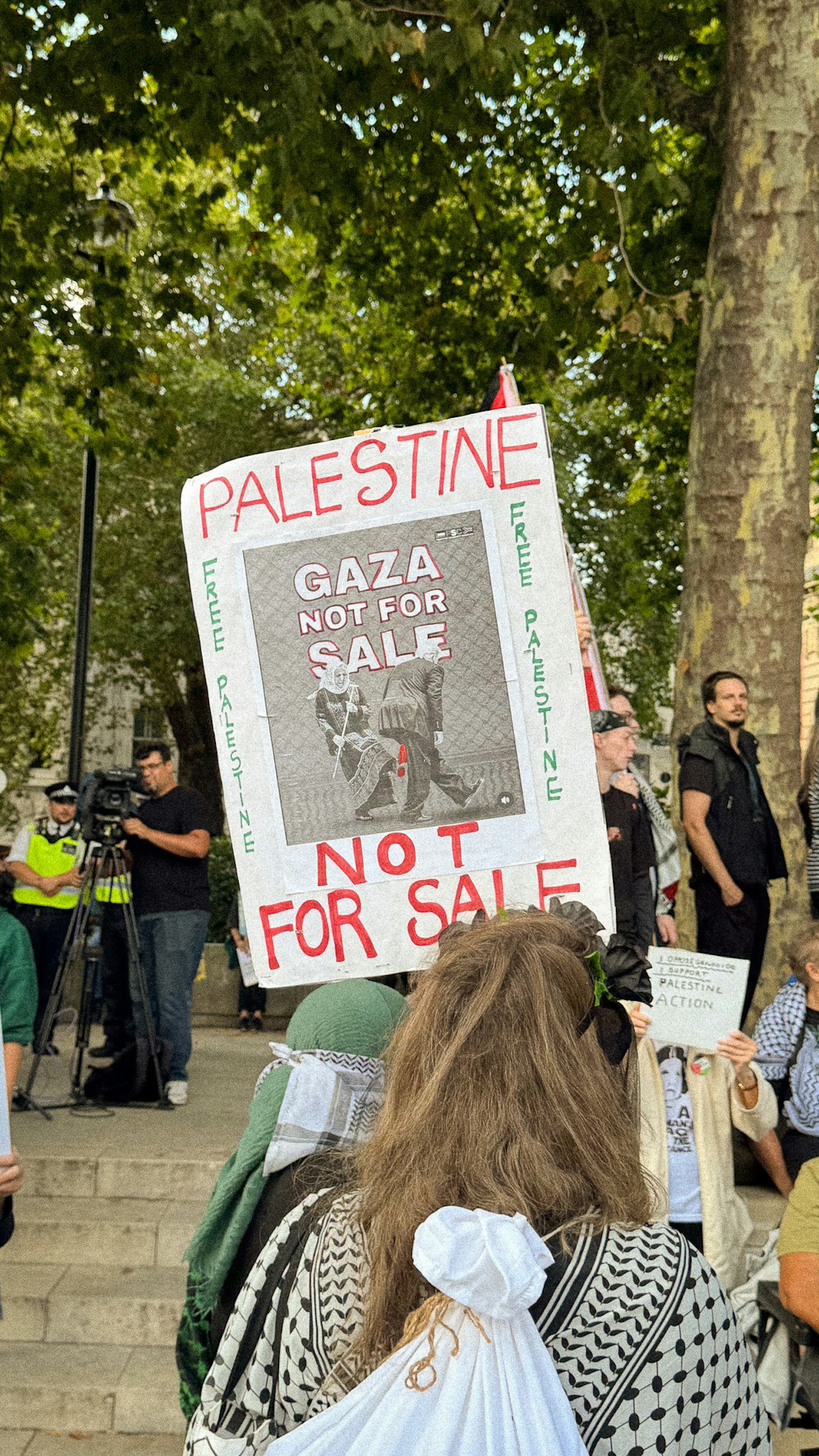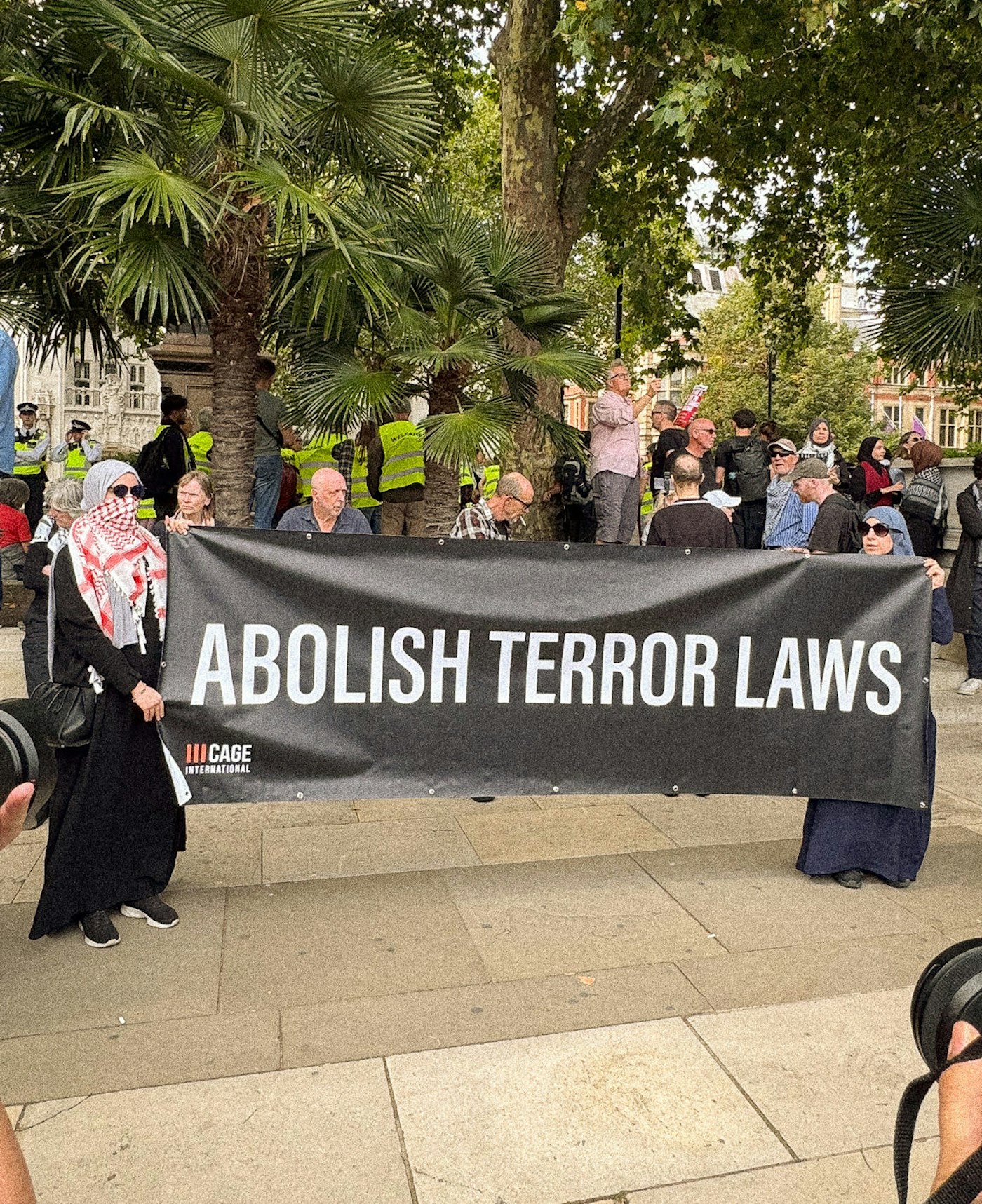‘Lift the Ban’: What to Expect at a Day of Civil Disobedience With Defend Our Juries
by Amaliah Team in World on 2nd October, 2025

Civil disobedience is the act of intentionally breaking a law believed to be unjust. For Dr Asim Qureshi, it “unmasks the cruelty of laws that criminalise solidarity.”
On Saturday, 4 October 2025, Defend Our Juries is planning another day of civil disobedience at Trafalgar Square as part of their ‘Lift the Ban’ campaign to demand the de-proscription of Palestine Action as a terrorist organisation. Section 13 of the Terrorism Act 2000 makes it a criminal offence to wear or display items that give reasonable suspicion of supporting a proscribed organisation in a public place.
Defend Our Juries are calling for hundreds of people to peacefully display signs in support of Palestine Action, and risk being arrested and prosecuted under section 13 in order to defy the Government’s decision to proscribe a direct action protest group as a terrorist organisation and subsequently categorise peaceful protestors who hold up signs supporting them as ‘terrorists’.
Defend Our Juries have held many similar days of action since the proscription came into effect on 5 July 2025, seeing over 1,500 people arrested under these terrorism laws. On 7 September 2025, 890 arrests were made, making it one of the biggest collective acts of civil disobedience in history.

History of civil disobedience in the UK
Civil disobedience has a long tradition in the UK, from the Suffragettes’ campaign of direct action in pursuit of women’s right to vote, which included deliberate property destruction and arson, to the collective defiance of Thatcher’s Poll Tax introduced in the late 1980s. In the 1980s, we also saw Greenham Common Women’s Peace Camp use direct action tactics to blockade RAF Greenham Common as part of the nuclear disarmament movement. In more recent times, we saw Just Stop Oil block roads and disrupt sporting events as part of their climate justice campaign, and the Black Lives Matter movement, despite COVID-19 restrictions, took to the streets to protest against police brutality following George Floyd’s murder. As we’re seeing today, civil disobedience, even within the last few years, has been met with violent policing and the use of (and introduction of new) measures clamping down on peaceful protest.
Defend Our Juries is the latest entry in this rich history of civil disobedience in the UK.
We now look back at these different movements of civil disobedience in reverence at their effectiveness and defiance in the face of obvious injustice. Our government even celebrated the legacy of the Suffragettes a few hours before voting to proscribe Palestine Action as a terrorist organisation.
As the genocide in Gaza continues, and the UK Government continues to provide reconnaissance support and export weapons components to Israel, members of the public from all walks of life feel increasingly compelled to resort to civil disobedience and direct action to make sure that the State can no longer ignore them, having seen two years of the national marches appear to fall on deaf ears.

Palestine Action were a group of activists who adopted civil disobedience as a tactic – using direct action to mainly target weapons factories in the UK and disrupt their supply chain. Their proscription is the first time terrorism legislation has been used to target a direct action protest group that damages property. Human rights organisations and several UN experts have condemned the use of these already broad and controversial terrorism laws being expanded further to crack down on non-violent civil disobedience, and interfering with the fundamental human right to freedom of expression and assembly.
What are the risks of taking part?
As Defend Our Juries set out in their call for action, expressing and inviting support, including by simply holding a sign that says ‘I oppose genocide, I support Palestine Action’, carries a significant risk of being arrested under the Terrorism Act 2000. If you take part in the action, you should expect to be arrested.

What to do if you are arrested?
If you are arrested, it is important to remain calm. Resisting arrest could lead to further charges. Unless suspected of anti-social behaviour, you are under no legal obligation to provide your personal details, such as your name and address, to the police. This includes your immigration status or nationality. Answer “no comment” to the police at all times until you have received legal advice from a specialist solicitor (rather than accepting a duty solicitor at the station). You can find a list of solicitors with expertise in protest law offering free 24-hour advice here.
What happens if you get arrested?
If you are arrested, the police must:
- tell you that you are being arrested and are not free to leave; and
- explain why they are arresting you.
If they do not give you this information as soon as is practicable, the arrest is unlawful.
After being arrested, you must be taken to a police station as soon as possible.
An officer will then review the facts and decide whether it is necessary to keep you in a police cell or whether you should be let go. You are likely to be released on bail to appear at a police station at a later date. Protestors who have been arrested have largely been given bail conditions prohibiting them from attending similar protests against the proscription of Palestine Action in the future.
The police and Crown Prosecution Service will review your case and decide whether to charge you and bring you to Court.
If you are then convicted under section 13 of the Terrorism Act 2000, you could face a fine of up to £5,000, and/or a maximum prison sentence of six months.
There is a more serious offence under section 12, which makes it an offence to invite support for, or express support for, a proscribed organisation. Convictions under section 12 carry a maximum penalty of 14 years’ imprisonment and/or an unlimited fine. However, the majority of those arrested at similar Defend Our Juries actions have been arrested under section 13 for sign holding, and all those charged to date have been under section 13.
What are the consequences of being charged under the Terrorism Act?
In September, the Metropolitan Police published a list of the potential consequences for those charged with offences under the Terrorism Act, specifically in reference to the growing number of people charged under these powers for showing support for Palestine Action. The consequences include:
- “A maximum sentence of six months’ imprisonment.
- The Disclosure and Barring Service (DBS) will have a record of a person’s TACT conviction, and this will be seen by employers who use DBS to carry out checks on staff or new applicants. The existence of a TACT conviction may be seen by employers as grounds for a refusal to employ a person or to dismiss them.
- Universities also carry out DBS checks, and may refuse entry to courses to those with terrorism convictions.
- Any application to visit another country usually requires a declaration of criminal convictions. A TACT conviction will be a potential bar to entry to countries including the US, Australia, Japan, and, from 2026 when the ETIAS system is introduced, countries of the European Union.
- If a person is a member of a professional body, they may face disciplinary proceedings and potentially removal from the profession.”
If you are arrested under the Terrorism Act, but you have not been charged, the details of your arrest will still appear on the Police National Computer; however, it will not be available on a standard DBS check when you seek future employment. The details of your arrest can be revealed on an enhanced DBS check, even if you were not charged, if that information is considered relevant to the role that you’re applying for.
What if I have an insecure immigration status?
The consequences of arrest and conviction are greater for those with insecure immigration status.
The Joint Council for the Welfare of Immigrants have produced this helpful immigration advice for people attending protests, setting out the immigration consequences of arrest and conviction for those with insecure status in the UK.
I don’t want to be arrested – can I still attend a Defend Our Juries protest?
It is not a criminal offence to show support for Palestine generally. We still have the right to protest against the genocide – this right is protected in law under the Human Rights Act 1998. It is only a criminal offence when you specifically show support for Palestine Action as a proscribed organisation.

There are hundreds of people and multiple civil society organisations who have attended these days of civil disobedience organised by Defend Our Juries to show solidarity to those carrying out the actions, and “bear witness to the Metropolitan Police’s use of terrorism powers.”
If you would like to attend the Defend Our Juries actions in this capacity, where you are not there to break the law and get arrested, it is still important that you remain careful and protect others around you. The police have acted in an aggressive manner at these protests, even towards those who aren’t participating in the sign-holding action. The risk of police mistreatment is generally higher for racialised and Muslim communities.
In order to protect you and others around you, remember:
- Attend and leave protests in a group. At least 3 people is a good rule of thumb.
- Try to avoid carrying any documents that could identify you.
- You are entitled and encouraged to film/live stream police interactions – make sure to warn them that you are filming.
- If you are asked to do something or stop doing something by the police, always ask them, ‘Under what power?’
- Unless you are suspected of engaging in ‘anti-social behaviour’, you do not need to answer police questions or provide them with any personal details. You can say no comment or simply walk away.
- If you are arrested at a protest, you will need a specialist criminal defence solicitor (rather than accepting a duty solicitor at the station) to advise you – you can find a list of solicitors specialising in protest law offering free 24-hour advice here.
It is very important to consider each of the risks set out above when deciding whether and how you would like to participate in the upcoming Defend Our Juries day of action. The risks of direct participation are significant under the Terrorism Act 2000; however, the call for action is also a reflection of the desperation that we find ourselves in during the genocide two years on, and the Government’s corresponding clampdown on our right to express solidarity with those who oppose it.
Amaliah Team
This article was written by a member of the Amaliah team or a collective team effort. You can follow us on @amaliah_tweets for the latest or head over to our Instagram @amaliah_com. If you're reading this and are thinking about contributing an article then send us an email with a brief or a full article to contribute@amaliah.com